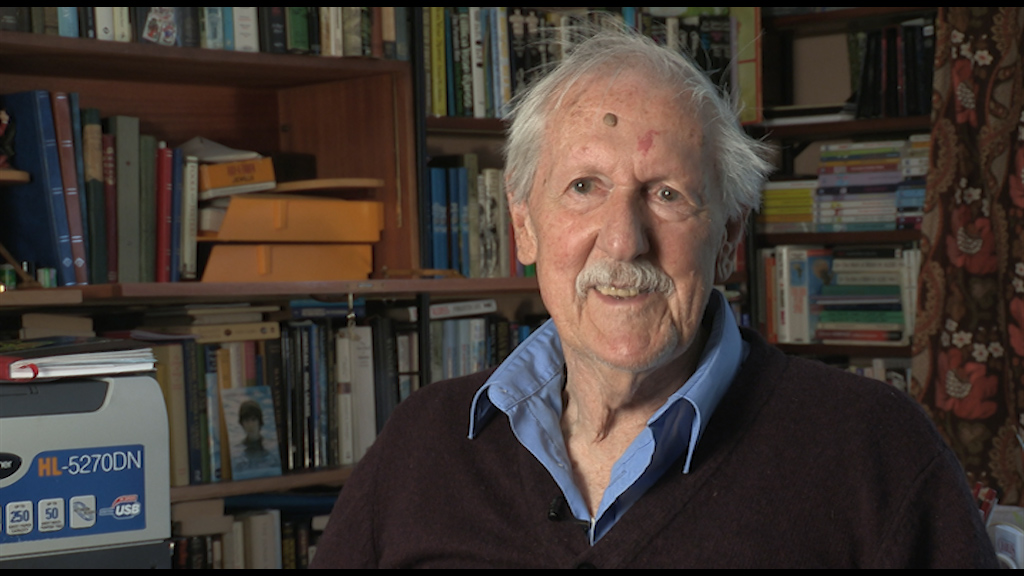NEXT STORY

My creative talent is rewarded
RELATED STORIES

NEXT STORY

My creative talent is rewarded
RELATED STORIES


|
Views | Duration | |
|---|---|---|---|
| 11. Schooldays in wartime | 58 | 03:09 | |
| 12. My creative talent is rewarded | 51 | 04:19 | |
| 13. The school Sister | 44 | 01:15 | |
| 14. Writing was just something I did | 45 | 02:21 | |
| 15. Books from my childhood | 57 | 03:46 | |
| 16. Captain Justice flies to the rescue! | 42 | 03:02 | |
| 17. Charles Monteith – a kindred spirit | 45 | 01:33 | |
| 18. Taking to the sea in Troopship Otranto | 39 | 04:23 | |
| 19. Destination: India | 46 | 04:33 | |
| 20. Dining on poached eggs on toast | 33 | 01:26 |


While we were at West Buckland, of course, we were tortured by news of the war and we were doing nothing, just kicking our heels and attending lessons. And, I have to say, that many… many of the masters teaching us had been combed from all over the place. Why? Because in wartime, men had been conscripted so that the masters who taught us were a very varied… varied lot. Mr McLintock was retired, but nevertheless, he taught the OTC, and he was a good man.
Then there was Mr Dale, Daly Boy… Daly Boy. Daly Boy taught us geography, and I think we made fun of him.
And, there was Harold Boyer... now Harold, I can't speak highly enough of Harold. You see, why was Harold there? Because he was of German extract and he was married to a charming lady, and they had, I suppose, they had fled from any centre of cultivation [sic], and they lived in a small cottage. I visited them there – a small cottage by steep cliffs on either side and this little river running by. So that every morning, Harold would walk two miles up to school to teach us. And he came from this place where the cottage was, which on the map is identified as Charles Bottom – always known at school as Charlie's Arse, of course. Charlie's Arse was where Harold Boyer lived. And Boyer was a marvellous teacher, and he would walk up and down and say, 'Facts! You must have facts'. We used to imitate him doing that.
But… he discovered that I was writing stories, and instead of beating me for it, he tried to induce me to write better stories. And he and I did establish a kind of rapport – the sort of rapport that, I don't know, I think is rather rare, but then, it was wartime.
Brian Aldiss (1925-2017) was an English writer and anthologies editor, best known for his science fiction novels and short stories. He was educated at Framlingham College, Suffolk, and West Buckland School, Devon, and served in the Royal Signals between 1943-1947. After leaving the army, Aldiss worked as a bookseller in Oxford, an experience which provided the setting for his first book, 'The Brightfount Diaries' (1955). His first science fiction novel, 'Non-Stop', was published in 1958 while he was working as literary editor of the 'Oxford Mail'. His many prize-winning science fiction titles include 'Hothouse' (1962), which won the Hugo Award, 'The Saliva Tree' (1966), which was awarded the Nebula, and 'Helliconia Spring' (1982), which won both the British Science Fiction Association Award and the John W Campbell Memorial Award. Several of his books have been adapted for the cinema. His story, 'Supertoys Last All Summer Long', was adapted and released as the film 'AI' in 2001. His book 'Jocasta' (2005), is a reworking of Sophocles' classic Theban plays, 'Oedipus Rex' and 'Antigone'.
Title: Schooldays in wartime
Listeners: Christopher Sykes
Christopher Sykes is an independent documentary producer who has made a number of films about science and scientists for BBC TV, Channel Four, and PBS.
Tags: West Buckland
Duration: 3 minutes, 9 seconds
Date story recorded: September 2014
Date story went live: 17 August 2015